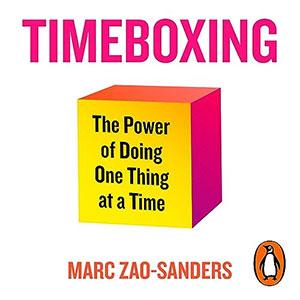Why timebox?
Most knowledge workers feel overburdened.
Like The Joker in the Batman movies, we have all, at one point or the other, muttered to ourselves: 'So much to do, so little time.'

Aditya, an 18 year old from Delhi, has completed Class 12 and is now preparing for the law entrance exam in December.
Recently, feeling bored at 10 pm, he decided to watch a movie on Netflix. The movie ended at 12.30 am.
When Aditya went to bed, he felt restless. At around 1 am, he started pacing the balcony of his flat. It was almost 2.15 am by the time he could sleep.
The next morning, when his mother woke him up at 8 am, he felt tired and groggy. He dozed off for another 45 minutes on the toilet seat.
By the time he had bathed it was 10.30 am. Breakfast took another half an hour.
Once at his desk, he started browsing through X and then could not resist catching up on the latest updates on Instagram.
Then he chatted with a friend over WhatsApp. When he glanced at the wall clock, it was almost 1 pm. Half the day had slipped by with nothing accomplished.
With a twinge of guilt, he turned to his books, consoling himself with the thought: "Well, tomorrow is another day."
This account, while fictional, mirrors the daily routines of countless individuals across age groups.
People start their day without an agenda and then coast along, swayed this way and that by whatever catches their fancy in the moment.
They are easy prey to the umpteen distractions that inevitably come along in this age of hyperconnectivity and social media.
Anyone who feels they lack a firm grip on their day should read Marc Zao-Sanders' Timeboxing and adopt its tenets.
Mr Sanders is the CEO and co-founder of filtered.com, a learning tech company.
A good life, he says, is the outcome of thoughtful choices. The trouble is that a lot of people are making very poor choices today. Timeboxing, he believes, can help them get their act together.
This time-management tool has two critical components. The first is the to-do list, where one jots down the important and urgent items to be accomplished during the day.
The second is the calendar (which can be physical or digital, though the latter, like the Google calendar, is recommended).
In the calendar, you create a timebox by naming a task and then assigning a start and a finish time to it. Repeat this for all the key tasks of the day.
The author recommends starting with a few timeboxes and gradually moving on to timeboxing a substantial part of the day as you become more proficient at this exercise.
This ritual of timeboxing should ideally be conducted late in the evening or early in the morning. The key is to carry it out when you are in a tranquil state and have not yet got caught in the day's rush.
 Photograph: Kind courtesy Penguin Michael Joseph
Photograph: Kind courtesy Penguin Michael JosephNext comes the implementation. In each time slot, work exclusively on the task assigned to that hour.
Put away the mobile phone, turn off the notifications on your laptop, and immerse yourself completely in the assignment.
Do not second-guess during the day. Unless something truly urgent comes up, stick to the choices (of things to do) made originally, when you were calm and best placed to decide on the most productive use of each hour.
Why timebox? Most knowledge workers feel overburdened. Like The Joker in the Batman movies, we have all, at one point or the other, muttered to ourselves: 'So much to do, so little time.'
When the cumulative burden of all the tasks weighs on our mind, we feel fatigued and overwhelmed. Assigning one task to a specific time slot eases the load.
Saying yes to one thing and no to a thousand others is, according to Mr Sanders, immensely liberating. More than just a productivity hack, timeboxing, according to him, promotes mental well-being.
Timeboxing also enables practitioners to live more mindfully. Time is an intangible resource that flows unseen.
Many, especially in their youth, are not keenly conscious of it and squander it recklessly. By breaking up the day into several boxes, giving a name and assigning a task to the hours, we make it a more tangible presence in our lives.
We can then go about optimising its potential.
Mr Sanders has written this book in a simple and accessible style.
The chapters are concise and easy to breeze through. But the book's message is potent and ought to be embraced by all who aim to harness this most finite and non-renewable of resources.
Motivational guru Stephen Covey once said one must heed not just the clock but also the compass. Travelling faster is futile if the end of the journey reveals you have been travelling in the wrong direction.
So, define your life's goal and purpose -- its true north -- and then employ timeboxing to live each day with greater intent and purpose.
Feature Presentation: Ashish Narsale/Rediff.com











